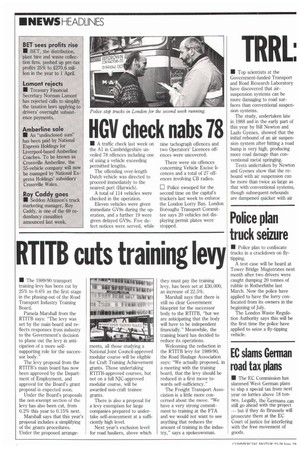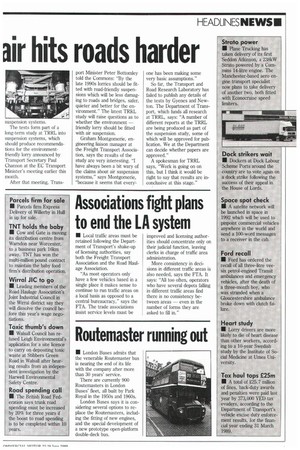TRRL
Page 6

Page 7

If you've noticed an error in this article please click here to report it so we can fix it.
air hits roads harder
• Top scientists at the Government-funded Transport and Road Research Laboratory have discovered that airsuspension systems can be more damaging to road surfaces than conventional suspension systems.
The study, undertaken late in 1988 and in the early part of this year by Bill Newton and Lazio Gyenes, showed that the initial rebound of an air suspension system after hitting a road bump is very high, producing more road damage than conventional metal springing.
Tests undertaken by Newton and Gyenes show that the rebound with air suspension can be more than twice as large as that with conventional systems, though subsequent rebounds are dampened quicker with air suspension systems.
The tests form part of a long-term study at TRRL into suspension systems, which should produce recommendations for the environmentfriendly lorry announced by Transport Secretary Paul Channon at the EC Transport Minister's meeting earlier this month.
After that meeting, Trans
port Minister Peter Bottomley told the Commons: "By the late 1990s lorries should be fitted with road-friendly suspensions which will be less damaging to roads and bridges, safer, quieter and better for the environment." The latest TRRL study will raise questions as to whether the environment — friendly lorry should be fitted with air suspension.
Graham Montgomerie, engineering liaison manager at the Freight Transport Association, says the results of the study are very interesting. "I have always been a bit wary of the claims about air suspension systems," says Montgomerie, "because it seems that every' one has been making some very basic assumptions."
So far, the Transport and Road Research Laboratory has failed to publish any details of the tests by Gyenes and Newton. The Department of Transport, which funds all research at TRRL, says: "A number of different reports at the TRRL are being produced as part of the suspension study, some of which will be approved for publication. We at the Department can decide whether papers are approved."
A spokesman for TRRL says, "Work is going on on this, but I think it would be right to say that results are inconclusive at this stage."














































































































































































